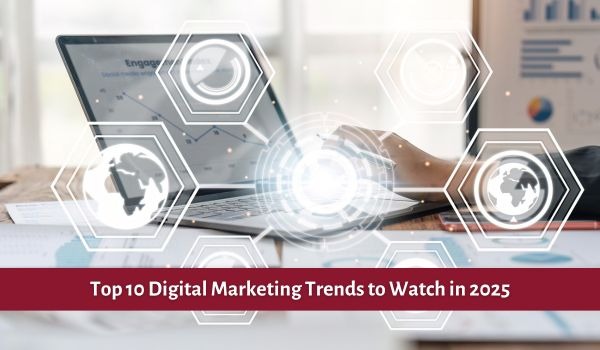Top 10 Digital Marketing Trends to Watch in 2025
Discover the top 10 digital marketing trends of 2025 that will transform your strategies. From AI-powered tools to AR/VR experiences, stay ahead in the evolving digital landscape.
DIGITAL MARKETING
12/31/20243 min read


In the fast-paced world of digital marketing, staying ahead of emerging trends is essential for businesses looking to maintain a competitive edge. As consumer behaviors evolve and technology advances, marketers must adapt their strategies to meet new demands. The year 2025 promises exciting opportunities, with innovative tools and techniques reshaping the digital landscape. This article explores the top 10 digital marketing trends you need to watch in 2025, helping you stay informed and prepared for the future.
Top 10 Digital Marketing Trends to Watch in 2025
1. AI-Powered Marketing
Artificial Intelligence (AI) continues to revolutionize digital marketing. AI tools enable predictive analytics, personalized content recommendations, and enhanced customer segmentation. Chatbots and AI-driven customer support are becoming increasingly sophisticated, providing 24/7 assistance and improving user experiences. Marketers should invest in AI to automate repetitive tasks and focus on strategic decision-making.
2. Voice Search Optimization
With the rise of voice assistants like Alexa, Google Assistant, and Siri, optimizing for voice search is essential. Voice searches are often longer and conversational, so incorporating long-tail keywords and natural language in content is vital. Marketers should also focus on creating FAQ pages and ensuring their content is mobile-friendly.
3. Interactive Content
Interactive content, such as quizzes, polls, calculators, and augmented reality (AR) experiences, is gaining popularity. This type of content engages users and keeps them on your website longer. Interactive content not only boosts engagement but also improves lead generation by providing valuable insights into customer preferences.
4. Short-Form Video Content
Platforms like TikTok, Instagram Reels, and YouTube Shorts are dominating the video content space. Short-form videos are highly engaging and have higher chances of being shared. Businesses should focus on creating concise, impactful videos that resonate with their target audience. Storytelling, humor, and relatable themes work exceptionally well in this format.
5. Sustainability Marketing
Consumers are becoming more conscious of environmental issues, and brands that demonstrate sustainability gain a competitive edge. Highlighting eco-friendly practices, using sustainable packaging, and supporting green initiatives can help build trust and loyalty among eco-conscious customers.
6. Social Commerce
Social media platforms are increasingly integrating shopping features, making it easier for users to shop without leaving the app. Features like Instagram Shops, Pinterest Buyable Pins, and TikTok’s in-app shopping are transforming how consumers make purchases. Brands should optimize their social commerce strategies by using high-quality visuals, influencer collaborations, and seamless checkout processes.
7. Zero-Click Searches
Google’s featured snippets and knowledge panels provide answers directly on the search results page, reducing the need for users to click through to a website. To stay relevant, businesses must focus on optimizing content for featured snippets by providing concise, valuable, and well-structured information.
8. Personalization
Personalized marketing continues to be a game-changer. Consumers expect tailored experiences, from email campaigns to product recommendations. Leveraging data analytics and customer behavior insights can help create hyper-personalized content that drives conversions and enhances customer satisfaction.
9. Privacy-Centric Marketing
With increasing concerns about data privacy and stricter regulations like GDPR and CCPA, businesses must prioritize user data protection. Transparent data policies, cookie-less tracking methods, and ethical marketing practices are essential for building trust. Using first-party data and maintaining compliance with privacy laws will be critical in 2025.
10. Augmented Reality (AR) and Virtual Reality (VR)
AR and VR technologies are transforming the way consumers interact with brands. From virtual try-ons for fashion and beauty products to immersive virtual tours for real estate, these technologies provide unique experiences. Investing in AR and VR can help businesses stand out and create memorable brand interactions.
Conclusion
The digital marketing landscape in 2025 will be shaped by technological advancements and evolving consumer expectations. By embracing these trends, businesses can enhance their online presence, improve customer engagement, and achieve sustainable growth. Stay proactive, keep experimenting, and leverage these trends to stay ahead in the dynamic world of digital marketing.
FAQs
Q1: Why is AI important in digital marketing?
AI enhances efficiency, enables personalization, and provides valuable insights through data analysis, improving overall marketing strategies.
Q2: How can small businesses adopt these trends?
Small businesses can start by focusing on one or two trends, such as social commerce or interactive content, and gradually expand as they see results.
Q3: What is the future of privacy-centric marketing?
With stricter data regulations, privacy-centric marketing will focus on transparency, ethical practices, and leveraging first-party data to build trust.
By staying informed and adaptable, marketers can make the most of 2024’s digital marketing trends and achieve significant growth.
